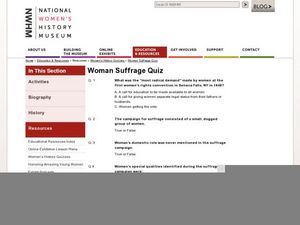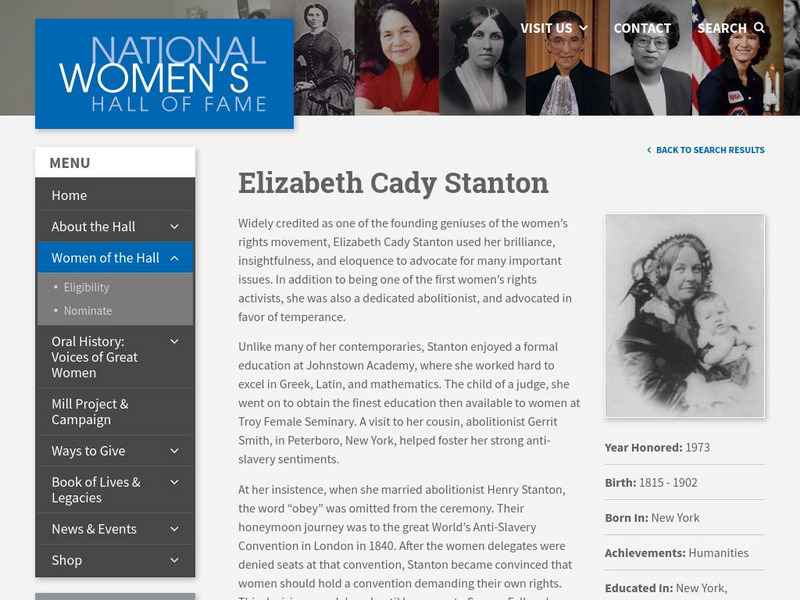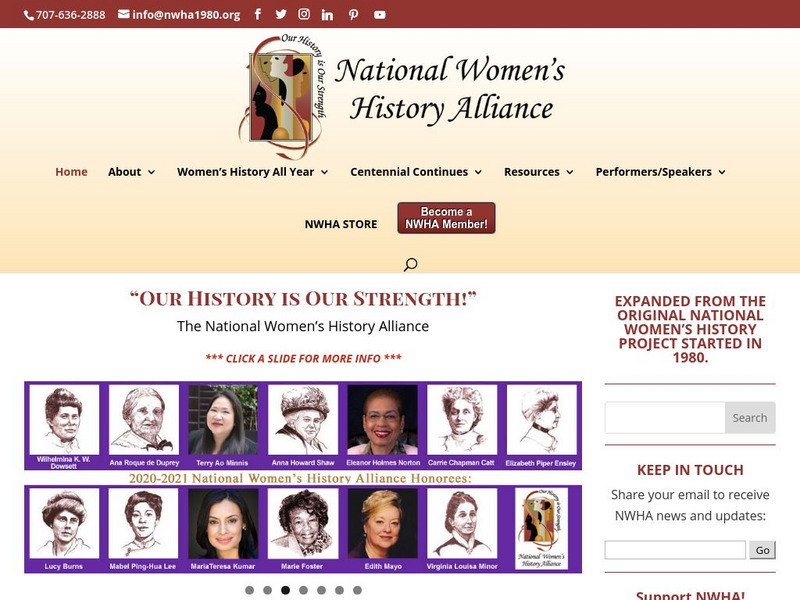Curated OER
A Brief History of Women in America
The story of women throughout American history is fascinating. Travel the path from domestic slave to the modern day with advocates such as Susan B. Anthony, the Grimké Sisters, and Gloria Steinem. A wonderful presentation that shows how...
National Endowment for the Humanities
Cultural Change
High schoolers research the passage of the 19th Amendment as an illustration of the mutual influence between political ideas and cultural attitudes. They also read the Seneca Falls Declaration and explore the cultural shifts it both...
North Carolina Civic Education Consortium
The Nineteenth Amendment
Beginning with an exercise of favoritism to engage learners, progressing through image and primary source analysis of the Nineteenth Amendment and the Seneca Falls Declaration, and culminating in a look at a political cartoon called...
Curated OER
Antebellum Revivalism and Reform
A gold mine for American history teachers, this presentation cascades through the middle of the 19th century with the central themes of moral and social reform. Between the blossoming Mormon church, the tightening of the Temperance...
Curated OER
Woman Suffrage Quiz
What does your class know about the women's suffrage movement? Can they name the patron saint of this movement? Or can they explain why babies were used in the suffrage campaigns? Do they know what the most radical demand was? If so,...
Curated OER
Catherine Blaine: Seneca Falls and the Women's Rights Movement in the State of Washington
Students recognize the accomplishments of Catherine Blaine. In this Women's Rights Movement lesson, students research primary and secondary sources about life for American women in the 1800's. Students trace Blaine's journey from Seneca...
Other
Www Virtual Library: Amdocs: The Seneca Falls Declaration (1848)
The full text of the 1848 Seneca Falls Declaration of Sentiments, by women's rights activist Elizabeth Cady Stanton.
OpenStax
Open Stax: Women's Rights
From a chapter on " Antebellum Idealism and Reform Impulses," this section explains the connections between abolition, reform, and antebellum feminism and also describes the ways antebellum women's movements were both traditional and...
A&E Television
History.com: Women's History Month
Comprehensive site that delves into the history of women's suffrage and the famous women that we celebrate that helped to change history.
National Endowment for the Humanities
Neh: Edsit Ement: Cultural Change
Exciting lesson plan teaching students about the social change in women's role in society that allowed women the right to vote. Students will learn about the process women went through to gain the right to vote by exploring various...
Internet History Sourcebooks Project
Fordham University: Modern History Sourcebook: The Declaration of Sentiments
This resource gives an introduction to "The Declaration of Sentiments" from the Seneca Falls Conference in 1848, which demanded rights for women, as well as a full text accompanying it.
National Women's Hall of Fame
National Women's Hall of Fame: Elizabeth Cady Stanton
Brief biography of this famous women's rights leader.
Other
Susan B. Anthony Center for Women's Leadership
Resources, such as a timeline of women's struggle for equality in America, on topics related to the history of women in the United States. Also find information on two nineteenth-century rights activists, Susan B. Anthony and Elizabeth...
Other
Living the Legacy: The Women's Rights Movement
The homepage of the National Women's History Project, this site includes links to suffrage history, timeline, a chat room, and student projects. Also information about the 150th anniversary of the Seneca Falls convention and national...
Other
Victory for the Vote
Read the story of the suffragists and the contemporary status of women's rights in the current political scene.
National Women’s History Museum
National Women's History Museum: Woman Suffrage Timeline (1840 1920)
Timeline explores women's suffrage from 1840 to 1920.
Smithsonian Institution
National Portrait Gallery: The Seneca Falls Convention
Short essay on the Seneca Falls Convention, illustrated with portraits of four key drivers behind the convention: Elizabeth Cady Stanton, Lucretia Mott, Frederick Douglass, and Susan B. Anthony.















